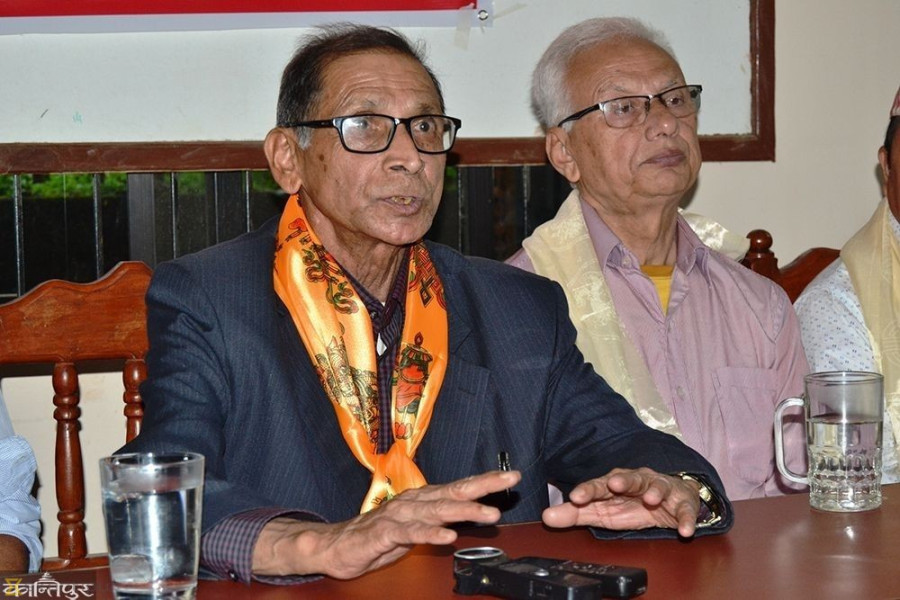Valley
Fringe communist parties launch a movement against the ruling Nepal Communist Party, calling them ‘fascists’
Seven years on, as the newly minted Nepal Communist Party looks to mark its first anniversary on Friday, four communist parties and one communist front—led by Baidya and Gajurel—have announced the launch of a peaceful movement against what they call the “corrupt” and “fascist” Nepal Communist Party.
Tika R Pradhan
In 2012, Mohan Baidya and CP Gajurel, veteran leaders of Nepal’s communist movement, left the then Pushpa Kamal Dahal-led Unified Communist Party of Nepal (Maoist). Baidya had called the decision to sign the 2006 Comprehensive Peace Agreement and abandon the ‘people’s war’ a mistake. Netra Bikram Chand and Ram Bahadur Thapa both sided with Baidya and also left the party.
Seven years on, as the newly minted Nepal Communist Party looks to mark its first anniversary on Friday, four communist parties and one communist front—led by Baidya and Gajurel—have announced the launch of a peaceful movement against what they call the “corrupt” and “fascist” Nepal Communist Party.
“The communists have emerged victorious, but what did the people—the working class, the proletariat—for whom they vowed to fight, get?” asked Gajurel, coordinator of the Deshbhakta Jana Ganatantrik Morcha, one of the communist outfits.
The parties said that the actions of the current government, led by the Nepal Communist Party, show early signs of fascism, pointing to a proposed Media Council bill, which has courted controversy for provisions that many say could be used to curtail press freedom.
While Baidya and Gajurel, both one-time mentors to a generation of communist leaders, are leading the current movement, Chand is in the midst of an armed ‘unified revolution’ against the state. Thapa, meanwhile, is the current home minister, having returned to Dahal’s fold in 2016.
The Nepal Communist Party was formed last year after a merger between the KP Sharma Oli-led CPN-UML and the Communist Party of Nepal (Maoist Centre), led by Dahal. In the 2017 elections, the two parties together were handed a significant mandate to govern for a full five-year term, something that has not happened in Nepal since the restoration of democracy in 1990.
Among the protesting parties is the CPN (Maoist Centre), the namesake of Dahal’s former party, before its merger with the UML, led by the firebrand Gopal Kirati.
“This government is trying to control the media,” Kirati told the Post. “It is headed towards fascism.”
Kirati had disagreed with Dahal’s decision to merge with the UML, breaking away to form his own party. He described the ruling Nepal Communist Party as a party of “capitalists”.
The communist movement in Nepal has a long, but not unique, history of factionalism and splitting. The movement itself started 70 years ago, with the establishment of the Nepal Communist Party on April 22, 1949, coinciding with the birth anniversary of Vladimir Lenin. The movement went through phases of peaceful resistance and violent insurrection. In 1966, Oli, the incumbent prime minister and co-chair of the Nepal Communist Party, was himself a radical communist, involved in a bloody class struggle that aimed to behead landlords. The movement culminated in 1969, in what has come to be known as the Jhapa Revolt.
Oli, however, renounced violence and joined the parliamentary system that the country embraced in 1990.
Six years later, Oli’s current partner, Dahal, known then by the nom de guerre Prachanda, led the ‘People’s War’, a bloody civil conflict that would last for 10 years and claim nearly 17,000 lives.
The ultimate goal of the communist movement, according to both leaders, was the creation of an equal, just and egalitarian society.
But their contemporaries, who are not part of the ruling coalition, say the two leaders, along with their unified party, have forgotten what ‘egalitarian’ means.
“They are not communists anymore,” said Kirati. “When a ruler talks about democracy all the time and wishes to impose authoritarianism, we call it fascism. We don’t consider these people communists. They are pseudo-communists.”
Another communist outfit that has expressed serious reservations about actions of the current government is led by Rishiram Kattel, whose party also goes by the name ‘Nepal Communist Party’. Kattel had registered the name first with the Election Commission and had refused to withdraw the registration, forcing Oli and Dahal register their own party as “Nepal Communist Party (NCP)”.
“This government, which claims to never tire of rooting out corruption, is itself corrupt,” said Kattel.
These communist parties are holding a programme at Ratna Park on May 22 to “expose the government’s anti-national activities”, including the recent Media Council bill. The parties have decided to support the ongoing protest of the Federation of Nepali Journalists, which has demanded that the bill be withdrawn from Parliament, said Gajurel.
“This strong government has been weakened by its own activities,” said Gajurel. “If it fails to mend its ways, it will soon see its downfall.”




 16.4°C Kathmandu
16.4°C Kathmandu













